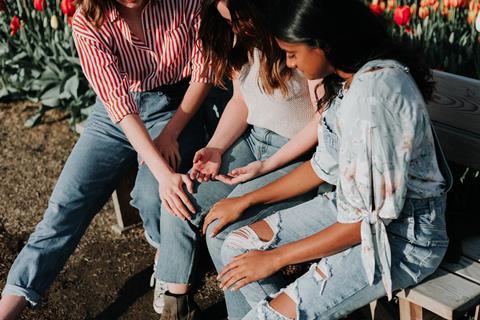Writer and recovering alcoholic Lauren Windle shares the invaluable support she got from her church community in early sobriety.

I had gone out to celebrate Easter Sunday with friends. I wasn’t a Christian at the time. I would have said I believed in Jesus, but the main significance of the event was that we all had four days off in a row. A few friends and I cooked up a Sunday roast and I poured myself several gin and tonics. After the meal was finished the crew headed to the pub to continue the festivities.
I don’t know what time I had my last drink or even what it was, but I know it was in the early hours of Easter Monday morning. I didn’t make a fool of myself. I didn’t throw up or black out. I just had my drinks and then went home to bed. I woke up later on that day with a mild hangover and a craving for snacks of the deep-fried variety.
My friends had been pestering me to attend a recovery group as my behaviour was becoming increasingly erratic and unmanageable.
The following day, I went to a support group meeting for addicts and alcoholics. My friends had been pestering me to attend a recovery group as my behaviour was becoming increasingly erratic and unmanageable. Finally, the day after Easter Monday, I dragged myself along. I found the kind words and relatable stories of the other attendees remarkable. It was like someone had performed a magic trick where they had read my mind; my misery and desperation, and they were reciting it back to me.
Those groups continued to be a place of refuge and encouragement as I committed to staying away from alcohol and drugs. But it wasn’t the only community that kept me going. Five days after that first meeting, on the Sunday following Easter, I walked into a church. When the vicar instructed those who wanted prayer to come to the front, I forced myself to march to the left of the stage.
He, and a lovely couple, listened to me, prayed for me and offered me tea while we spoke. But it wasn’t their initial kind response that made the difference, it was their consistency. Over the following year-and-a-half, members of that church prayed with me, invited me into their homes, took me to their women’s Bible study, gave me my first Bible, talked me through repentance and what it meant, sent me verses and encouragement, and eventually sung Oh Happy Day as I was baptised.
I assumed that as people got to know me; horrible, broken, addicted, they would realise they didn’t want people like me around.
I assumed that as people got to know me; horrible, broken, addicted, they would realise they didn’t want people like me around. But it didn’t matter how confused, depressed, or angry I exposed myself as being, they continued to show up. Their attention changed my life and pointed me to Jesus.
People often ask if I would have been able to stay sober without the Church. Of course, there are plenty of people who don’t believe in Jesus and maintain secure sobriety. But for me, recovery groups and faith came hand in hand. I don’t want to know where I’d be now, if I’d tried to do this without the Church.




































No comments yet